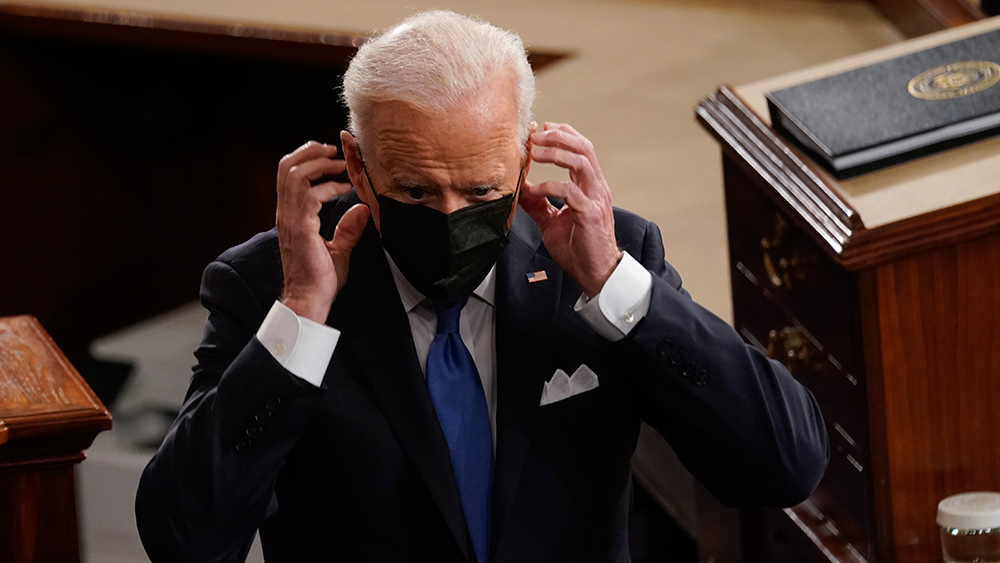Meet “Eris,” the new COVID-19 subvariant that’s about to be aggressively pushed as the next “plandemic”
08/24/2023 / By Olivia Cook

A fast-spreading new subvariant of the coronavirus that causes the Wuhan coronavirus disease (COVID-19) – nicknamed “Eris” by health watchers, but formally known as EG.5 – recently became the most prevalent strain in the U.S., according to recent official estimates, though it does not appear to cause significant illness or pose an immediate threat.
Eris or EG.5, an offshoot of the omicron variant and descendant of the Omicron XBB strain, has been circulating in the country since April. As of August 5, Eris accounts for 17.3 percent of COVID-19 infection cases in the U.S., according to the Centers for Disease Control and Prevention (CDC).
That number makes Eris the most dominant strain of COVID, with Eris infections jumping from the roughly 12 percent calculated last July 22. The variant has also been reported in several countries, including Britain, China and Japan.
In the U.K., EG.5.1, which falls under the EG.5 lineage, makes up an estimated 14.55 percent of cases – making it the second most prevalent strain, according to the UK Health Security Agency. (Related: UK lockdown files show health officials conspiring to “scare the pants off everyone” – “When do we deploy the new variant?”)
On July 19, the World Health Organization (WHO) named EG.5 and its descendants “variants under monitoring.” That means the variant may have undergone genetic changes that could make it more transmissible than other variants, though more research and monitoring is necessary to know for sure.
Eris “not a cause for concern” despite rapid spread, government claims
Medical experts have noted that Eris does not seem to cause more severe illness than previous strains, and the White House and Capitol Hill have yet to issue strong statements on the matter.

A CDC spokesperson told Politico that at this time, there is no evidence indicating EG.5 is able to spread more easily, and the agency believes currently available treatments and vaccines will still work against the new variant.
Although COVID hospitalizations have risen slightly over the summer in the U.S., the Biden administration has continued to express optimism about beating the pandemic. The government has ended the public health emergency and the White House COVID czar left earlier this summer.
EG.5 and EG.5.1 still account for less than 20 percent of infections in the U.S., so the increase in hospitalizations is perhaps not entirely variant-driven, said Dr. T. Ryan Gregory, an evolutionary biologist at the University of Guelph in Ontario.
Immunity from vaccination wanes over time, leaving people more vulnerable to infection and severe disease. Factors like the dropping of masking protection and more indoor gatherings could also contribute to the current summer wave, Gregory said.
At this stage of the pandemic, it’s not as likely that a new variant will cause a tsunami of cases. Gregory said it’s more likely scientists will see a “rising sea level” – a higher baseline of cases that won’t get lower.
“A sustained high baseline means a lot of infections overall, which means more long COVID and more variant evolution,” Gregory told Verywell Health in an email.
According to Zoe Health Study, an organization that monitors and estimates COVID cases in the U.K., Eris has similar symptoms to Omicron, which include cough, fatigue, fever, headache, runny or stuffy nose (nasal congestion), sneezing, sore throat and changes to the sense of smell.
Will vaccines work against Eris?
The last time the vaccines were updated, they were made to target both the original COVID-19 strain as well as Omicron BA.4 and BA.5.
In June, federal regulators asked Pfizer, Moderna and Novavax to create a new formulation of their COVID-19 vaccines. The upcoming boosters, the pharmaceutical giants claimed, will target XBB.1.5, nicknamed “Kraken.”
Earlier this month, CDC Director Mandy Cohen said in a National Public Radio interview that the boosters would be ready in “early October.”
Eris is also an XBB descendant and only two mutations away from XBB.1.5, which is why vaccine shills and the government feel confident the new boosters will work against Eris. But with the COVID vaccines’ track record of massive failure, it is highly unlikely that they could offer even a semblance of protection, let alone help prevent infections.
So far, since the rollout of COVID vaccines in 2020, the only thing the jabs have proven is that they cause a plethora of serious injuries and can leave the vaccinated either struggling with disabilities or dead.
Visit Pandemic.news for more stories about emerging COVID variants.
Watch the following video about “Eris” – new COVID variant.
This video is from the WAKE UP channel on Brighteon.com.
More related stories:
Indonesian scientists claim to have discovered the MOST MUTATED COVID-19 variant.
New Acturus strain of COVID-19 RESISTS antibodies, spreads rapidly across many countries.
New “Omicron” variant so far detected ONLY in the “fully vaccinated.”
Sources include:
Submit a correction >>
Tagged Under:
big government, Big Pharma, CDC, coronavirus, covid-19, EG.5, EG.5.1, infections, national security, omicron, outbreak, pandemic, pharmaceutical fraud, propaganda, vaccines, XBB variant
This article may contain statements that reflect the opinion of the author



















